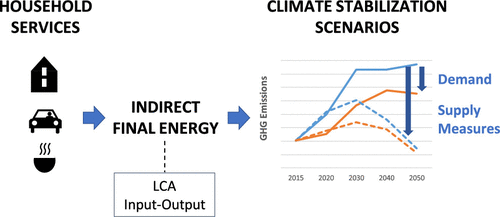当前位置:
X-MOL 学术
›
Environ. Sci. Technol.
›
论文详情
Our official English website, www.x-mol.net, welcomes your feedback! (Note: you will need to create a separate account there.)
A Framework for Modelling Consumption-Based Energy Demand and Emission Pathways.
Environmental Science & Technology ( IF 11.4 ) Pub Date : 2020-01-21 , DOI: 10.1021/acs.est.9b05968 Alessio Mastrucci 1 , Jihoon Min 1 , Arkaitz Usubiaga-Liaño 2 , Narasimha D Rao 1, 3
Environmental Science & Technology ( IF 11.4 ) Pub Date : 2020-01-21 , DOI: 10.1021/acs.est.9b05968 Alessio Mastrucci 1 , Jihoon Min 1 , Arkaitz Usubiaga-Liaño 2 , Narasimha D Rao 1, 3
Affiliation

|
Energy demand in global climate scenarios is typically derived for sectors - such as buildings, transportation, and industry - rather than from underlying services that could drive energy use in all sectors. This limits the potential to model household consumption and lifestyles as mitigation options through their impact on economy-wide energy demand. We present a framework to estimate the economy-wide energy requirements and carbon emissions associated with future household consumption, by linking Industrial Ecology tools and Integrated Assessment Models (IAM). We apply the framework to assess final energy and emission pathways for meeting three essential and energy-intensive dimensions of basic well-being in India: food, housing and mobility. We show, for example, that nutrition-enhancing dietary changes can reduce emissions by a similar amount as meeting future basic mobility in Indian cities with public transportation. The relative impact of energy demand reduction measures compared to decarbonization differs across these services, with housing having the lowest and food the highest. This framework provides complementary insights to those obtained from IAM by considering a broader set of consumption and well-being-related interventions, and illustrating trade-offs between demand and supply-side options in climate stabilization scenarios.
中文翻译:

基于消耗的能源需求和排放途径建模框架。
在全球气候情景中,能源需求通常来自建筑,运输和工业等部门,而不是来自可能推动所有部门能源使用的基础服务。通过限制家庭消费和生活方式对整个经济领域的能源需求的影响,这限制了其潜力。通过链接工业生态工具和综合评估模型(IAM),我们提供了一个框架来估算与未来家庭消费相关的全经济能源需求和碳排放量。我们应用该框架来评估最终的能源和排放途径,以满足印度基本福祉的三个基本和能源密集型维度:食物,住房和出行。例如,我们显示 营养改善饮食的变化可以减少排放,其量与通过公共交通工具满足印度城市未来的基本出行需求相当。与脱碳相比,减少能源需求措施的相对影响在这些服务中有所不同,其中住房最低,而食物最高。该框架通过考虑更广泛的与消费和福祉相关的干预措施,并说明了在气候稳定情景中需求方与供应方方之间的取舍,提供了与从IAM获得的见解互补的见解。
更新日期:2020-01-22
中文翻译:

基于消耗的能源需求和排放途径建模框架。
在全球气候情景中,能源需求通常来自建筑,运输和工业等部门,而不是来自可能推动所有部门能源使用的基础服务。通过限制家庭消费和生活方式对整个经济领域的能源需求的影响,这限制了其潜力。通过链接工业生态工具和综合评估模型(IAM),我们提供了一个框架来估算与未来家庭消费相关的全经济能源需求和碳排放量。我们应用该框架来评估最终的能源和排放途径,以满足印度基本福祉的三个基本和能源密集型维度:食物,住房和出行。例如,我们显示 营养改善饮食的变化可以减少排放,其量与通过公共交通工具满足印度城市未来的基本出行需求相当。与脱碳相比,减少能源需求措施的相对影响在这些服务中有所不同,其中住房最低,而食物最高。该框架通过考虑更广泛的与消费和福祉相关的干预措施,并说明了在气候稳定情景中需求方与供应方方之间的取舍,提供了与从IAM获得的见解互补的见解。



























 京公网安备 11010802027423号
京公网安备 11010802027423号